|
|
|
Sort Order |
|
|
|
Items / Page
|
|
|
|
|
|
|
| Srl | Item |
| 1 |
ID:
119961
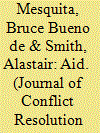

|
|
|
|
|
| Publication |
2013.
|
| Summary/Abstract |
Temporary membership on the United Nations Security Council (UNSC) has pernicious effects on the political and economic development of nations, particularly in nondemocracies. The leaders of rich democratic states often trade resources for the salient policy favors that UNSC members can deliver. This provides the leaders of temporary UNSC members with access to "easy money" resources. Such resources have deleterious consequences, particularly in nondemocracies, because they provide leaders with the means to pay off their coalition of supporters without reliance on tax revenues. While foreign aid is an important form of easy money bribe, it is but one of many. Empirical tests show loans are a substitute means for bribing UNSC members.
|
|
|
|
|
|
|
|
|
|
|
|
|
|
|
|
| 2 |
ID:
188444
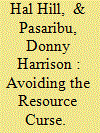

|
|
|
|
|
| Summary/Abstract |
Natural resources—blessing or curse? Indonesia provides an excellent case study for an examination of this question. It is a major commodity exporter; the fourth most populous country in the world; and the world’s largest archipelagic state with huge mineral, forest and maritime resources. Indonesia also has three distinctive features that are particularly relevant for such a study. First, with the exception of the Asian Financial and COVID-19 crises, it has had at least moderately strong economic performance for the past half-century. This distinguishes it from the majority of resource-rich developing countries, and therefore there are lessons to be learnt from its management of these boom and bust episodes, particularly the latter. Second, Indonesia has experienced two rather different resource booms—the first based mainly on oil and gas in the 1970s and the second based primarily on coal, palm oil and gas over the years 2005–11. The economic, social and environmental effects of these two booms have differed significantly. Third, the country experienced major regime change in 1998–99, from the centralized, authoritarian Soeharto regime in 1966–98, which presided over the first boom, to the subsequent democratic, decentralized regime during the second boom. The very different political and institutional arrangements had important implications for the management of the boom and its distributional effects. We examine these issues in a comparative context, employing as reference points two very large natural resource exporters, Brazil and Nigeria, and Malaysia, a smaller, more dynamic Southeast Asian comparator.
|
|
|
|
|
|
|
|
|
|
|
|
|
|
|
|
| 3 |
ID:
126572
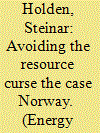

|
|
|
|
|
| Publication |
2013.
|
| Summary/Abstract |
In many countries, natural resources have been detrimental to the economic development. The literature on "the resource curse" shows a bleak relationship: countries with large natural resources generally experience lower economic growth than other countries. Norway does not fit into this picture. Economic growth has much higher than in most other industrialized countries. This paper describes the key features of the Norwegian management of the petroleum resources. The main focus is on the management of the revenues from the petroleum sector, but the effects of the petroleum sector on the Norwegian economy more generally are also discussed.
|
|
|
|
|
|
|
|
|
|
|
|
|
|
|
|
| 4 |
ID:
104443
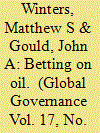

|
|
|
|
|
| Publication |
2011.
|
| Summary/Abstract |
Can international donors ensure that poor countries spend their natural resource revenues on development? This article reviews the Chad-Cameroon Oil Pipeline Project and the World Bank's fourteen-year effort to foster pro-poor expenditure of resource revenues in Chad. The World Bank used its leverage as a gatekeeper of private sector oil investment to write fiscal restrictions and extragovernmental oversight into Chadian law. These efforts, however, were not sufficient to overcome the country's poor governance and weak political accountability. The article argues that external donor efforts to build better governance in undemocratic states are unlikely to overcome resource curse and obsolescing bargain dynamics. They may even do more harm than good. The article recommends that the World Bank implement the 2003 Extractive Industry Review suggestion to cease investing in oil production. If the Bank does continue to lend to countries like Chad, it must ensure that it retains leverage across the life of the project in order to achieve its goals.
|
|
|
|
|
|
|
|
|
|
|
|
|
|
|
|
| 5 |
ID:
080811


|
|
|
|
|
| Publication |
2008.
|
| Summary/Abstract |
West Kalimantan (West Borneo) has a history of violent communal conflict.1 It also has extensive forests that have been looted for decades. The argument will be that these two are linked, but not by the grievances of the forest dwellers. Except in its first few days, the two main episodes of 1997 and 1999 were not driven mainly by grievances among marginal groups. Rather, explanations based on the 'resource curse' carry more weight. These focus attention on the contested nature of the state, rather than on rebellious activities of marginal groups. When state institutions were thrown into disarray by the sudden resignation of President Suharto in 1998, Dayak militants already close to state power rewrote the rules of local politics by demonstratively 'cleansing' certain areas of an unpopular immigrant minority. This theatrical manoeuvre impressed political rivals sufficiently to allow Dayaks to gain control over several timber-rich districts, which had a thriving black economy. Malays later imitated these techniques to stem the tide
|
|
|
|
|
|
|
|
|
|
|
|
|
|
|
|
| 6 |
ID:
166564


|
|
|
|
|
| Summary/Abstract |
Since the middle of the last century, the world has seen the emergence of Sovereign Wealth Funds (SWF). According to the Sovereign Wealth Funds Institute (2012), these legal entities can be defined as “a state-owned investment fund or entity that is commonly established from balance of payments surpluses, official foreign currency operations, the proceeds of privatizations, governmental transfer payments, fiscal surpluses, and/or receipts resulting from resource exports.” The SWFs are governed by the Santiago Principles, a document constructed by the IMF's International Working Group of Sovereign Wealth Funds (IWG) to recommend and to standardize the applications and investments of this kind of fund. SWFs are created in order to meet macroeconomic demands, using a series of investments strategies, which including foreign assets acquisitions. For instance, the Norwegian Government Pension Fund is one of the world's model SWFs. Its revenue is obtained from petroleum exploitation and is considered a savings fund, although part of the financial return can be applied in budget deficit. Following this example, Brazil created the Pre-Salt Social Fund to invest pre-salt petroleum revenues, and consists of a savings fund, according to the IMF classification. The present article focuses on the analysis and comparison of the legal structures of the Norwegian Government Pension Fund (GPF) and the Brazilian Pre-Salt Social Fund (SF), aiming to understand if the Brazilian fund applies the Norwegian standards.
|
|
|
|
|
|
|
|
|
|
|
|
|
|
|
|
| 7 |
ID:
177617
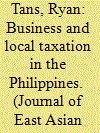

|
|
|
|
|
| Summary/Abstract |
This article argues that weak local governments increase levels of taxation by “borrowing” institutional capacity from certain types of businesses. While many businesses lobby against taxation, businesses that are locally owned, nationally connected, and logistically complex build robust associations that support taxation. These types of businesses benefit from improvements in public infrastructure, so they empower their associations to monitor members’ tax compliance and to pressure officials to uphold their spending commitments. The article demonstrates the necessity of business support for taxation in the absence of state capacity by comparing two Philippine cities that differ in their ability to tax despite a number of similarities between them. The case studies show that tax increases co-varied with business support, and that business support waxed and waned depending on over-time variation in the capability of business associations to discourage tax evasion and to enforce official commitments to spend on infrastructure.
|
|
|
|
|
|
|
|
|
|
|
|
|
|
|
|
| 8 |
ID:
096269
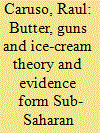

|
|
|
|
|
| Publication |
2010.
|
| Summary/Abstract |
This paper is intended to complement the existing literature on civil wars. First, it presents a simple theoretical model of conflict that defines a two-sector economy. In a contested sector, two agents struggle to appropriate the maximum possible fraction of a contestable output. In an uncontested sector, they hold secure property rights over the production of some goods. Agents split their resource endowment between 'butter', 'guns' and 'ice-cream'. Following the theoretical insights the empirical analysis focuses on the relationship between civil wars and different sectors of the economy. In particular, a panel probit specification shows that the incidence of a civil war decreases in the size of manufacturing sector.
|
|
|
|
|
|
|
|
|
|
|
|
|
|
|
|
| 9 |
ID:
125849
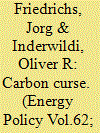

|
|
|
|
|
| Publication |
2013.
|
| Summary/Abstract |
The carbon curse is a new theory, related to but distinct from the resource curse. It states that fossil-fuel rich countries tend to follow more carbon-intensive developmental pathways than [if they were] fossil-fuel poor countries, due to a hitherto unappreciated syndrome of causal mechanisms. First, fuel rich countries emit significant amounts of CO2 in the extraction of fuel and through associated wasteful practices such as gas flaring. Second, easy access to domestic fuel in such countries leads to crowding-out effects for their energy mix and economic structure (for example, abundant oil may displace other fuels from the energy mix and lead to the "Dutch Disease"). Third, fuel abundance weakens the economic incentive to invest in energy efficiency. Fourth, governments in fuel rich countries are under considerable pressure to grant uneconomic fuel consumption subsidies, which further augments the carbon intensity of their economic output. Due to the combined effect of these causal mechanisms, it is genuinely difficult for fuel rich countries to evade carbon-intensive developmental pathways. And yet there are remarkable exceptions like Norway. Such positive outliers indicate that the carbon curse is not destiny when appropriate policies are adopted.
|
|
|
|
|
|
|
|
|
|
|
|
|
|
|
|
| 10 |
ID:
161768
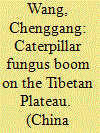

|
|
|
|
|
| Summary/Abstract |
In the last two decades, the Tibetan regions of China have been experiencing a remarkable economic boom fueled by the caterpillar fungus, known in the West as the “Viagra of the Himalayas” or “Tibetan Gold.” This article examines the impacts of the caterpillar fungus boom on Tibetan pastoralists' current-day livelihood and the prospects of their future economic development. Our study is based on a household survey conducted in 2016 covering 58 villages across the Tibetan autonomous land area. Results show that the new stream of cash income from gathering and trading caterpillar fungus has had a strong short-term welfare-improving effect. Household consumption, healthcare spending, and religious charity have risen sharply with caterpillar fungus income. Unfortunately, the fungus boom has not brought about productive investment or human capital accumulation that is conducive to long-term growth. Rather, the resource windfall has created disincentives for school attendance, nonfarm labor participation, and productivity improvements in pastoralism. The resource boom-induced disinvestments, if persistent, will likely further limit the capabilities of rural Tibetans to compete in the urban labor market, reinforcing the emerging trend of socioeconomic marginalization. We contextualize these findings in terms of Tibetans' cultural and economic rationale, pointing out new directions for future research and policymaking.
|
|
|
|
|
|
|
|
|
|
|
|
|
|
|
|
| 11 |
ID:
144851
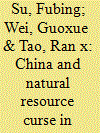

|
|
|
|
|
| Summary/Abstract |
China's rising demand for natural resources and its growing presence in many poor and resource-rich countries have been criticized for promoting neo-colonialism in the 21st century. Using panel data for 135 developing countries from 1995 to 2007, the present paper empirically evaluates the validity of such claims. Our findings do not support the resource curse thesis in the areas of industrialization and economic growth. Moreover, the effect of resources is conditional on the initial quality of political institutions in a country.
|
|
|
|
|
|
|
|
|
|
|
|
|
|
|
|
| 12 |
ID:
102681
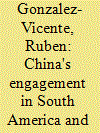

|
|
|
|
|
| Publication |
2011.
|
| Summary/Abstract |
China's engagement in South America and Africa's extractive sectors has increased significantly in the last decade. How comparable are the African and South American cases from a developmental perspective? This article explores resource curse theories, arguing that the 'curses' often associated to extraction are historically produced dynamic processes that need to be reevaluated in light of China's direct and indirect impacts on resource-endowed countries. It elaborates a framework to compare the developmental dynamics entailed by China's involvement in the South American and African extractive sectors, distinguishing between external, internal and intrinsic 'curses'. The article holds that China's growth and investment have strengthened the position of resource-endowed countries in the international economy, revitalizing resource industries and improving terms of trade for commodities. Concurrently, the expansion of extractive activities has brought about increased environmental and economic sustainability challenges. Divergences between the African and South American cases are best observed at the national levels, where China's non-interventionist approach has different developmental implications depending on internal trends within investment host countries.
|
|
|
|
|
|
|
|
|
|
|
|
|
|
|
|
| 13 |
ID:
142044


|
|
|
|
|
| Summary/Abstract |
Critiques of China’s ‘oil diplomacy’ center on its alleged disregard for transparency and human rights, yet such claims ignore that the problematic relationship between resource extraction and human rights precedes Chinese market entry. This article explores whether human rights implications are more serious for states exporting oil to China compared to another major oil importer, the United States. Contrary to the conventional wisdom, we argue that oil export dependence on the USA affects human rights more negatively than dependence on China because of differences related to the timing of market entry. The United States established stable relationships with oil supplier states decades ago, creating dependencies that are sufficiently long-term for the implications of the resource curse to take hold, and taking place before human rights became part of the US foreign policy agenda. In comparison, China’s late entry into global oil markets in the early 1990s meant that market access often required the provision of generous loan packages, which may help counteract the detrimental effects of oil dependence. Our empirical analysis examines the impact of oil export dependence on China versus the USA on human rights in supplier states for the 1992–2010 period. Results show that oil producing states dependent on exports to the USA exhibit lower human rights performance than those exporting to China. We also demonstrate that lower human rights performance for US exporters stems from long-term trends rather than short-term fluctuations in oil export dependence.
|
|
|
|
|
|
|
|
|
|
|
|
|
|
|
|
| 14 |
ID:
174886
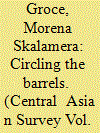

|
|
|
|
|
| Summary/Abstract |
Most of Kazakhstan’s wealth hinges on oil rents, and the overall performance of the economy is closely linked to petroleum’s price fluctuations. This study asks (1) why the institution of private ownership of oil proceeds has not led to a positive transformation of patron–client relations embedded in the country’s energy sector, thus challenging the relevance of the ‘private ownership’ narrative, and (2) why the collapse in the price of oil did not affect the stability and essential character of the regime in power. To answer these questions, the article examines two case studies: the privatization of the oil sector in the 1990s, and the post-2014 oil crisis. Thus the article problematizes important theories on oil-sector privatization and contributes to recent work on regime stability as it pertains to the resource curse. The analysis of the constitutive impact of oil wealth on Kazakh politics generates wider insights on the links between the power of informal networks and regime stability in petrostates through boom and bust cycles.
|
|
|
|
|
|
|
|
|
|
|
|
|
|
|
|
| 15 |
ID:
110806


|
|
|
|
|
| Publication |
2012.
|
| Summary/Abstract |
Many regions that are endowed with scarce natural resources such as arable land and water, and which are remote from a central government, suffer from violence and ethnic strife. A number of studies have looked at the convergence of economic, political and ecological marginality in several African countries. However, there is limited empirical study on the role of violence in pastoral livelihoods across ecological and geographical locations. Yet, case studies focusing on livelihood and poverty issues could inform us about violent behaviour as collective action or as individual decisions, and to what extent such decisions are informed or explained by specific climatic conditions. Several case studies point out that violence is indeed an enacted behaviour, rooted in culture and an accepted form of interaction. This article critically discusses the relevance of geographical and climatic parameters in explaining the connection between poverty and violent conflicts in Kenya's pastoral areas. These issues are considered vis-à-vis the role institutional arrangements play in preventing violent conflict over natural resources from occurring or getting out of hand. The article uses long-term historical data, archival information and a number of fieldwork sources. The results indicate that the context of violence does not deny its agency in explanation of conflicts, but the institutional set-up may ultimately explain the occurrence of the resource curse.
|
|
|
|
|
|
|
|
|
|
|
|
|
|
|
|
| 16 |
ID:
161558


|
|
|
|
|
| Summary/Abstract |
Despite the emergence of a rich literature on the rise of China in Latin America (LAC) since 2000, we are still grappling with this phenomenon. In this article we seek to theorize this expanding South–South relationship from two vantage points. First, from the perspective of China, we argue that, by necessity, the PRC has had to internationalize its development strategy in order to compensate for its serious natural resource deficit, feed the world's largest domestic population, and fuel the soon-to-be largest economy in the world. LAC has been just one slice of China's ‘go out’ strategy. Our second perspective probes the effect of China's entry into the region. Through the lens of development economics, we identify three separate political economy scenarios that have been accentuated within those countries that have the strongest economic ties with China. We rely on measures of institutional performance and macro-economic trends to illustrate the variable effects of China on LAC.
|
|
|
|
|
|
|
|
|
|
|
|
|
|
|
|
| 17 |
ID:
095085
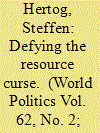

|
|
|
|
|
| Publication |
2010.
|
| Summary/Abstract |
The article explains how several Gulf rentier monarchies have managed to create highly profitable and well-managed state-owned enterprises (SOEs), confounding expectations of both general soe inefficiency and the particularly poor quality of rentier public sectors. It argues that a combination of two factors explains the outcome: the absence of a populist-mobilizational history and substantive regime autonomy in economic policy-making. The authors concludes that it is necessary to rethink the commonly accepted generalizations both about rentier states and, arguably, about public sectors in the developing world.
|
|
|
|
|
|
|
|
|
|
|
|
|
|
|
|
| 18 |
ID:
188690


|
|
|
|
|
| Summary/Abstract |
Oil and gas discoveries in developing countries are often associated with shortsighted economic policies and, in response, with calls to insulate resource management from populist impulses. The authors report on a randomized experiment that tested methods to overcome this apparent tension between sound resource governance and democratic politics. Soon after Tanzania's discovery of major natural gas reserves, the authors invited a nationally representative sample of voters to take part in an intensive public deliberation of policy options, at an event featuring nationally recognized experts and small-group discussions. Democratic deliberation reinforced the public's strong preference for rapid spending of gas revenues, but also increased support for various prudential and economically orthodox measures, such as the independent oversight of gas revenues, limits on government borrowing, and selling gas abroad rather than subsidizing fuel at home. These effects were driven by deliberation per se, rather than a pure information treatment, and show no evidence of contamination by facilitator effects or peer effects in group deliberations.
|
|
|
|
|
|
|
|
|
|
|
|
|
|
|
|
| 19 |
ID:
087359
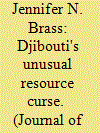

|
|
|
|
|
| Publication |
2008.
|
| Summary/Abstract |
An extensive literature on the 'resource curse' posits that abundant natural resources 'curse' countries possessing them with negative economic, social and political externalities. Usually, scholars identify tangible resources like oil, diamonds or timber, rarely questioning whether other kinds of resources might have the same impact, and under what conditions. This paper examines how little-studied Djibouti's non-tangible resources - geo-strategic location and aid-inspiring poverty - have produced 'curse' effects; with an economy dominated by US and French military spending (and concomitant aid) and rents on trade passing to and from Ethiopia, tiny Djibouti suffers from this curse. It draws four conclusions. First, resource curse effects can derive from non-traditional sources. Second, leaders' policy decisions matter at least as much as the presence or absence of resources. Third, advanced countries' spending patterns in their less-developed allies often produce unintended consequences. Finally, even tiny countries can provide scholars and policy makers with new insights.
|
|
|
|
|
|
|
|
|
|
|
|
|
|
|
|
| 20 |
ID:
167426
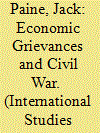

|
|
|
|
|
| Summary/Abstract |
A large body of scholarship suggests that economic grievances play an important role in civil wars. But what specific economic activities trigger such grievances, and why would governments not take proactive steps to limit economic grievances in order to stabilize their regimes? This article argues that specific economic activities—those that undermine a producer’s ability to exit the formal economy—cause governments to make taxation decisions that, despite the costliness of fighting, increase the likelihood of civil war. An inability for producers to exit the formal economy also undermines regional autonomy deals by encouraging governments to grab short-term rents despite the risk of triggering civil war. After deriving this “redistributive grievance” mechanism by analyzing an infinite-horizon bargaining model with endogenous labor supply and economic production, I address a specific empirical source of such redistributive grievances: oil-rich regions fight separatist civil wars relatively frequently. Capital-intense, geographically concentrated, and immobile oil production corresponds with conditions in the formal model that predict redistributive grievances and war. Moreover, I argue that applying the redistributive grievances mechanism to understanding the oil-separatism relationship also highlights shortcomings of alternative “greed”-based explanations.
|
|
|
|
|
|
|
|
|
|
|
|
|
|
|
|
|
|
|
|
|